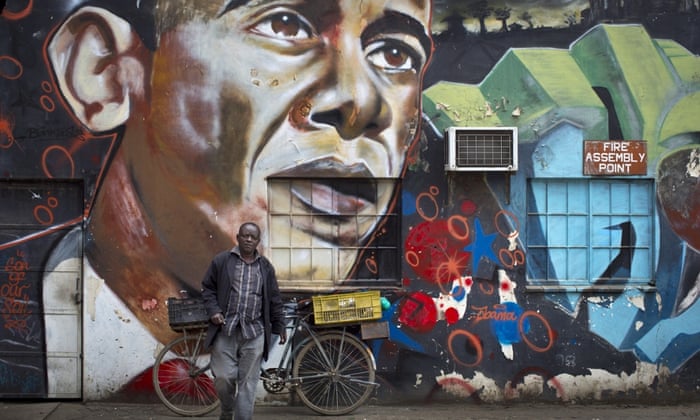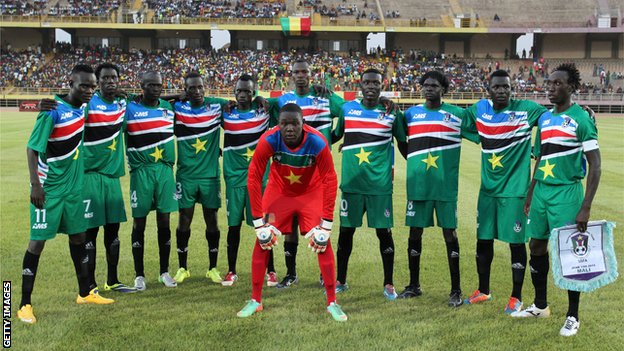Obama is on a roll. He arrived in east Africa on the back of a ruling upholding his healthcare plan, endorsement of his Pacific trade agreement, a nuclear deal with Iran, the reopening of diplomatic relations with Cuba, and stirring eulogy in Charleston. He disembarked Air Force One in Nairobi with a spring in his step and proceeded to confidently skewer homophobia, misogyny, corruption and dictatorship.
Yet few of the usual reactionary voices were raised to accuse him of being a “western neocolonial” meddling in traditions and cultures he didn’t understand. Presumably his African heritage was an important deflector shield. But it’s all downhill from here: the continent can be forgiven for mustering less enthusiasm for president Hillary Clinton, Jeb Bush or… Donald Trump.
An open-top bus tour was never going to happen
Major roads in Nairobi were closed and deserted, which spoiled the atmosphere a bit, while there was even less interaction with the public in Ethiopia. The Washington Post reported: “The spectre of terrorism had made preparing for this trip particularly complicated for the White House. A law enforcement official familiar with Secret Service security and logistics planning said the visit had been the most challenging since George W Bush went to Islamabad in 2006, based on the level of terrorist activity and lack of infrastructure in the region.”
‘Africa rising’ is now conventional wisdom
Obama noted that “Africa is on the move” more than once. Politicians and entrepreneurs love to point out that the old stereotypes of war, famine and hopelessness have been replaced by some of the fastest growing economies in the world, as if they are the first to discover it. In fact so many people have said this so often, is there anyone left who still doubts it?
Obama is a master of analogy
The president compared homophobia in Africa with racism in America, and his own respect for presidential term limits with African leaders who won’t let go (the football fans’ chant would be “Are you watching, Paul Kagame?”).
A less successful use of this rhetorical device was his drawing of a parallel between corruption in Kenya and corruption in the Chicago of Al Capone, since it implied that countries move in a linear progression and Kenya trails America by nearly a century.
‘Don’t mention the gays’ is a bad tactic
Before Obama’s visit, a leading activist said he hoped there would be no mention of homophobia, since it would cause a firestorm engulfing all other subjects. But when a journalist raised the issue at a press conference, Obama gave an “unequivocal” answer as Kenya’s Uhuru Kenyatta, no fan of gay rights, was forced to take the medicine – a fine piece of political theatre. Such is Obama’s popularity in Kenya that there was relatively little media backlash against him, suggesting that by making gay rights a talking point, and perhaps changing a few minds, his directness did more good than harm.
Fine line between shaking hands, and staying away
Analysts such as Jeffrey Smith warned that by setting foot in Ethiopia, Obama would confer legitimacy on an authoritarian regime that won 100% of seats at the last election. The president made things worse with his with only significant gaffe of the trip, twice describing the government as “democratically elected”.

A mural of President Barack Obama by the Kenyan graffiti artist Bankslave at the GoDown Arts Centre in Nairobi, Kenya
Yet some here welcomed the chance to see prime minister Hailemariam Desalegn put on the spot. For its part, the White House defended the principle of engagement, pointing out that no one questions visits to China or Russia, despite their dubious records. Meanwhile Obama shook hands with Kenyan deputy president William Ruto, who still faces trial at the international criminal court, yet refused to invite Zimbabwe’s Robert Mugabe to the African Union despite him being its current chairman. It’s complicated.
China is an American rival in Africa
While White House officials gave the standard line – “We welcome China in Africa” – Nils Tcheyan, director of government relations for General Electric in Africa, told the same press briefing: “I mean, we can talk about China as a competitor, and there’s no doubt about it, they are a competitor.”
Steve Case, chief executive of investment firm Revolution, offered this take: “I think the first wave of investment in Africa was around infrastructure. I think the next wave, which is now just breaking, is around innovation. And that where I think the United States is particularly advantaged.”
One former African president described the trip as “too little too late”, suggesting that Obama has more style but less substance on the continent than his white predecessor. The president was visibly stung by doubters of his signature Power Africa initiative, a public-private partnership that aims to add 30,000 megawatts to serve 60m households and businesses.
Obama parried: “This isn’t a beauty contest between presidents; this is the US government and whatever the policies that need to be put in place in order for us to help our partner countries. I think president George W Bush’s Pepfar initiative [to combat HIV/Aids] was as significant an achievement internationally as anything that we’ve done over the last several decades. It saved millions of lives.”
The African Union’s golden opportunity
The continental body has been described as Muammar Gaddafi’s plaything and a pointless talking shop that makes even the European Union look dynamic. Obama was the first US president to address it, seemingly untroubled that its headquarters are a $200m gift from China, and giving it unprecedented prestige and exposure. The African Union will never have a better chance to assert itself, starting (hopefully) with a prompter-than-usual response to the next major crisis or conflict.
He touched Lucy
Obama was not only allowed up close to view Lucy – the 3.2 million-year-old skeleton of the “grandmother of humanity” – but to touch it. Journalists present noticed that the fossil was kept in an old box with captions that looked like they’d been typed out in the 1970s – “This would never happen at the Smithsonian”.
Families are complicated for everyone
Western media references to Obama’s “half-sister” Auma and “step-grandmother” Sarah prompted debate on Twitter, with some arguing that in Africa there are no such terms, only “sister” and “grandmother”. In Nairobi, Obama had dinner with three dozen relatives, some of whom he had never met before: “In these extended families, there are cousins and uncles and aunties that show up that you didn’t know existed but you’re always happy to meet,” he said. He also said he spent part of the meal “begging for forgiveness” that his schedule does not allow him to spend more time with them.
Obama really doesn’t need to worry about getting elected again
Fox News and the so-called “birther” movement would have had a field day if Obama had visited Kenya before the 2012 presidential election, gaining a whole new round of ammunition to question his “Americanness”. A giant billboard in downtown Nairobi proclaimed, “Welcome Home President Obama”, he began each speech with a local phrase and told one adoring crowd: “I’m the first Kenyan-American to be president of the United States.”
White House staff reckon this was his last visit to the continent as president, but the melody lingers on. “I’ll be back,” he said, not deliberately referencing The Terminator. “The next time I’m back I may not be wearing a suit.”



